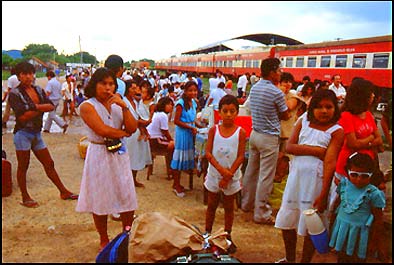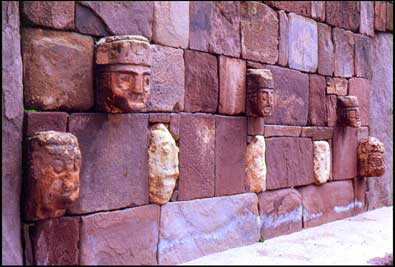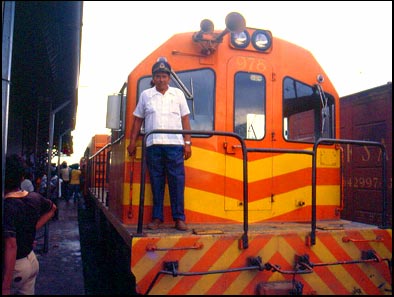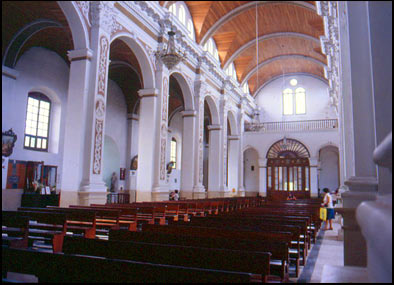|
|
||
|
Bolivia
|
![]() Bolivia.
I
traveled to Bolivia on my first trip to South America in 1984. Crossing South
America, by train from São Paulo, I was among many international
travelers, "viajeros", who met on the train and were staying in
the same economy hotels and youth hostels. Most of us "gringos"
were following the South American Handbook , to guide us on the
way. At the western end of the Brazilian train line, to Corumba, we got visas
and vacinations, and crossed the border into Bolivia. In the nearby town
of Porto Suárez, at the eastern terminus of the Bolivian railway,
we boarded the train. which would cross the plains to Santa Cruz de la Sierra.
The tracks were so rough and irregular that picture taking was almost impossible.
The train cars were filled with farmers, villagers, and soldiers. There
was no drinking water, and only warm sodas and warm beer were to be had.
In a kitchen car, like a cookhouse on a ranch, food was prepared and delivered
to your seat in a bowl with a spoon. Burlap sacks, containing foodstuffs
and other things, blocked the aisles almost everywhere, making it difficult
to walk. A small bicycle was stuffed vertically, in the bathroom. The train
stopped several times during the night, for hours at a time. In the small
towns along the tracks, villagers sold food and drinks at the stations.
Some travelers rode on top of the coaches. The legend is that the name "tren
del la meurte", death train, came from people falling off. When we
finally arrived in Santa Cruz, there was a transport strike, so we hired
a jeep to take us into town. After a few days we decided to board the plane
to La Paz. With the buses still on strike, we walked to the airport early
in the morning and boarded a plane to the worlds highest capital city. (5,000
meters) I had "soroche", altitude sickness, for a week. With the
help of some medicine and chewing cocoa leaves from the market, my body
finally adjusted to the altitude. After 10 days of exploring La Paz and
and the nearby snow capped mountains, we boarded a bus, to continue our
voyage to the Sanctuary of the Virgin of Copacabana, on the shores of Lake
Titikaka, and then continued on to Peru. Photographs
and text by John O'Heron ©2025
Bolivia.
I
traveled to Bolivia on my first trip to South America in 1984. Crossing South
America, by train from São Paulo, I was among many international
travelers, "viajeros", who met on the train and were staying in
the same economy hotels and youth hostels. Most of us "gringos"
were following the South American Handbook , to guide us on the
way. At the western end of the Brazilian train line, to Corumba, we got visas
and vacinations, and crossed the border into Bolivia. In the nearby town
of Porto Suárez, at the eastern terminus of the Bolivian railway,
we boarded the train. which would cross the plains to Santa Cruz de la Sierra.
The tracks were so rough and irregular that picture taking was almost impossible.
The train cars were filled with farmers, villagers, and soldiers. There
was no drinking water, and only warm sodas and warm beer were to be had.
In a kitchen car, like a cookhouse on a ranch, food was prepared and delivered
to your seat in a bowl with a spoon. Burlap sacks, containing foodstuffs
and other things, blocked the aisles almost everywhere, making it difficult
to walk. A small bicycle was stuffed vertically, in the bathroom. The train
stopped several times during the night, for hours at a time. In the small
towns along the tracks, villagers sold food and drinks at the stations.
Some travelers rode on top of the coaches. The legend is that the name "tren
del la meurte", death train, came from people falling off. When we
finally arrived in Santa Cruz, there was a transport strike, so we hired
a jeep to take us into town. After a few days we decided to board the plane
to La Paz. With the buses still on strike, we walked to the airport early
in the morning and boarded a plane to the worlds highest capital city. (5,000
meters) I had "soroche", altitude sickness, for a week. With the
help of some medicine and chewing cocoa leaves from the market, my body
finally adjusted to the altitude. After 10 days of exploring La Paz and
and the nearby snow capped mountains, we boarded a bus, to continue our
voyage to the Sanctuary of the Virgin of Copacabana, on the shores of Lake
Titikaka, and then continued on to Peru. Photographs
and text by John O'Heron ©2025
|
Puerto Suárez, Bolivia, 1984 |
Tihuanaco Inka Ruins, 1984 |
|
"Tren de la Muerte," Puerto Suárez to Santa Cruz |
Catedral San Lorenzo, Santa Cruz de la Serra |



